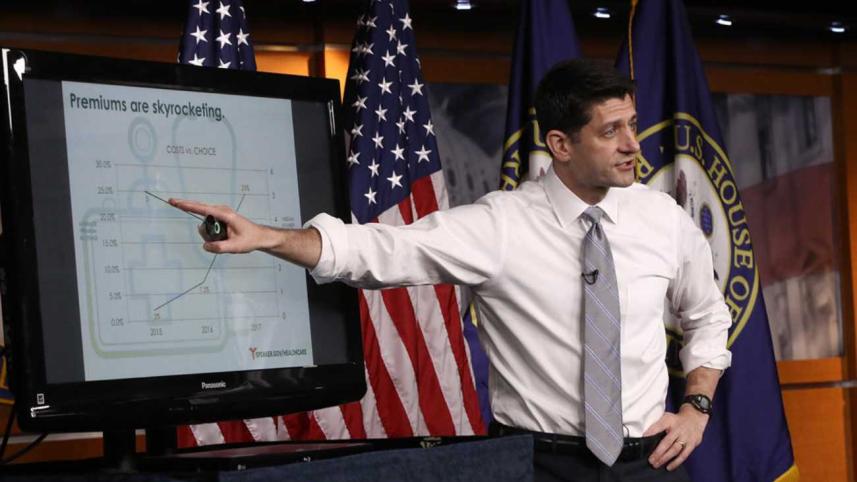REPEAL OBAMACARE? NOT SO FAST

For supporters of the Democratic Party (present company included) the election results last November brought a deep sense of foreboding. The Republican Party was in control of both the Senate and the House, and the White House was occupied by a rabble rouser with scant regard for policy, or for that matter, facts. The potential for serious harm was considerable.
The Affordable Care Act, also known as Obamacare, the first ever attempt to make healthcare accessible to all Americans, could be a casualty.
Until Obamacare was passed, the United States had the dubious distinction of being the only country among industrialised countries to lack universal healthcare. Statistics alone cannot do justice to the horror visited upon people. Medical bankruptcies – financial ruin brought by exorbitant medical costs – ruined countless lives, insurers could turn down people for preexisting conditions, and many low-income people went without insurance because it was too expensive.
In a word, a monstrous system.
Former US President Barack Obama and the Democratic Party moved heaven and earth to get Obamacare passed in 2010. It was not easy, nor was it pretty. The Republican Party, out of sheer partisan spite, went on a blistering campaign to undo it. The Tea Party movement, a grassroots campaign, led to crushing Democratic losses in Congress.
Many former presidents, going as far back as Teddy Roosevelt, have tried to reform healthcare and failed. Richard Nixon, a Republican, wanted to reform it. So did Harry Truman, and even Bill Clinton.
Healthcare reform is devilishly difficult. Putting together a programme that extends coverage and also manages to avoid the wrath of doctors, health insurance companies and employers – all big players in America's pay-to-play political system, is a job that would try Solomon. Republicans have a reflexive dislike and fear of any government programme, particularly one that works.
Analysts often describe Obamacare as a three-legged stool. The three conditions of Obamacare are: Nobody, including those who were previously disqualified for preexisting conditions, can be denied health insurance. The second condition is that everyone – especially healthy, younger people – was required to buy insurance, to create a larger pool of revenue to help pay for older, sicker people. The third condition helped make it work – those who cannot afford insurance would get a government subsidy.
Given the complicated nature of healthcare and relentless Republican attacks, public opinion remained divided on Obamacare. While Obamacare has unresolved issues, its achievements are considerable. Over 20 million more Americans gained health insurance. The law set down rules so that health insurance includes free preventive checkups, maternity care, drug addiction. Plans cannot cap how much they will pay in a year. By taxing high earners, Obamacare creates a profound shift of resources from the rich to the poor.
However, the independent markets set up by Obamacare have not always worked well, and as premiums have gone up, Republican naysayers have pounced on its shortcomings.
Come November, last year, Republicans were giddy with victory and couldn't wait to get rid of Obamacare. House Republicans repealed the law over 50 times since it passed in 2010 – it either died in the Senate or Obama vetoed it.
Then a funny thing happened.
Polls began to show that suddenly Obamacare was more popular than it ever was. The public was still divided, but for the first time a slim majority was in favour of Obamacare.
More importantly, they overwhelmingly opposed dumping the law without a replacement. Several Republican House members had torrid encounters with irate constituents who benefited from Obamacare. "What was going to happen to my health insurance?" they asked.
Now things started to really get curious. Several Republican senators started to get cold feet. The Republicans have only 52 members in the Senate, so they can't afford to lose too many members. Yet Republican senators like Shelley Moore Capito of West Virginia, Lisa Murkowski of Alaska and Susan Collins of Maine expressed misgivings about any replacement that leaves hundreds and thousands of their constituents high and dry. Several Republican governors, including Ohio Gov. John Kasich, agreed.
In the House, on the other hand, there was the Freedom Caucus, a group of extreme partisan Republicans who wanted to dump Obamacare lock, stock and barrel.
Republican House Speaker Paul Ryan went to the drawing board. When he came out with a replacement plan, it was universally lambasted. The Congressional Budget Office was scathing, saying if the Ryan plan became law, 14 million would lose coverage in the first year. Of course, this being a Republican bill, it included a big tax giveaway to the rich.
The bill is scheduled for a vote, but it appears to be on life support.
And what of President Donald Trump? Well, Trump was being Trump. During his campaign, he had promised health insurance that would cover everyone, be cheaper and have more choices. In a word, terrific. The Ryan bill does none of that, but since our dear president never lets facts – a.k.a. fake news – get in the way of what he wishes to say, he is touting the Ryan bill.
The bitter intra-party Republican feud over Obamacare replacement, however, isn't going away. Exactly how much political capital Trump will expend – and how effective it will be – remains to be seen.
What's even worse, the Republicans may not be better off if Ryan's bill does pass. Many millions will likely lose health insurance. A large chunk is likely to be supporters of Trump and the Republicans.
The Republican predicament is aptly captured in what's known in US political circles as The Pottery Barn rule: "You break it, you own it."
The writer is a contributing editor for Siliconeer, a monthly periodical for South Asians in the United States.

 For all latest news, follow The Daily Star's Google News channel.
For all latest news, follow The Daily Star's Google News channel.